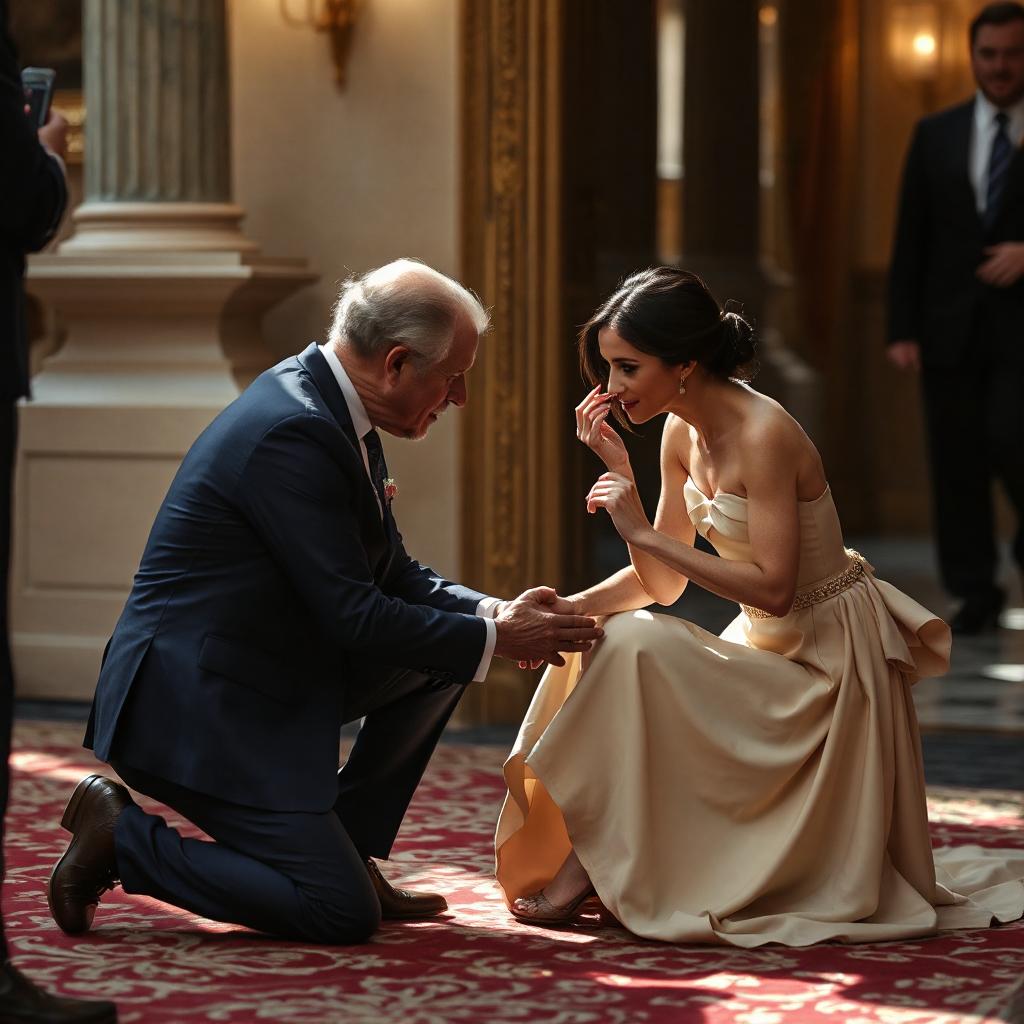In a dramatic turn of events, Buckingham Palace was abuzz last week when Meghan Markle made an unexpected return to the UK, drawing significant media attention and reigniting public interest in the royal family’s intricate dynamics. The visit culminated in an extraordinary moment: Meghan knelt before King Charles III, pleading for forgiveness and expressing her desire to regain her place within the royal fold.

The atmosphere at Buckingham Palace was tense as Meghan arrived. After stepping back from royal duties in early 2020 and relocating to the United States, her return was both surprising and laden with emotion. Many had speculated about her feelings toward the monarchy, especially after her and Prince Harry’s revelations in interviews and their memoirs, which had previously cast a shadow over their relationship with the royal family.
Meghan’s arrival coincided with a gathering of the royal family to commemorate the anniversary of Queen Elizabeth II’s passing. This poignant occasion provided the perfect backdrop for her return, prompting hopes for reconciliation. The royal family had been grappling with its public image, particularly after the controversies surrounding Meghan and Harry, making this moment all the more significant.
As Meghan approached King Charles in the palace garden, the atmosphere shifted from one of apprehension to one of profound vulnerability. With tears in her eyes, she knelt before the King and implored, “Father, please forgive me and grant me a title…” The emotional weight of her words echoed throughout the historic grounds, capturing the attention of those present and soon making headlines around the world.
This act of humility from Meghan marked a pivotal moment in her relationship with the royal family. By seeking forgiveness, she seemed to acknowledge the mistakes made during her time as a working royal. Her request for a title, a symbol of her former status, indicated a desire not only for reconciliation but also for a renewed sense of belonging within the royal hierarchy.
Observers noted that this moment of reconciliation echoed a broader theme of family dynamics—how misunderstandings and miscommunications can lead to rifts that may take years to mend. Many royal watchers expressed hope that this gesture would open the door to a new chapter for Meghan and the royal family, one characterized by understanding and healing rather than division.
However, the implications of Meghan’s request remain complex. Granting her a title would undoubtedly stir public debate, with many wondering whether it would be a step toward healing or merely reignite the controversies of the past. The royal family has historically been cautious about navigating issues of titles and public perception, particularly following the fallout from Harry and Meghan’s departure.
In the days following this unexpected encounter, media outlets and royal commentators have been analyzing the potential ramifications. Some believe that King Charles’s response could set the tone for the future of the monarchy, while others are more skeptical about the feasibility of reconciliation given the history of conflict.
As the world watches this unfolding narrative, the overarching theme of forgiveness remains central. Meghan’s plea serves as a reminder that even in the most public of families, the complexities of love and the desire for acceptance can often lead individuals to seek redemption in the most profound ways. Whether her kneeling will lead to a restoration of her place within the royal family remains uncertain, but it undeniably marks a significant moment in the ongoing saga of the British monarchy.
The events at Buckingham Palace reflect the complexities of family relationships, particularly under the scrutiny of the public eye. As discussions about reconciliation continue, many are left to ponder whether this moment could signify the beginning of a new, more harmonious chapter for Meghan and the royal family.

